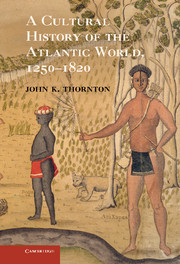Part I - The Atlantic Background
Published online by Cambridge University Press: 05 November 2012
Summary
The Atlantic Background
The formation of the Atlantic world was the result of Columbus’s voyages to America and subsequent discoveries in navigation that allowed European sailors, for the first time in history, to reach every other part of the world. It is not any surprise, then, that 1492, the date of Columbus’s crossing of the Atlantic, is a signal year in the history of the world, for the creation of the Atlantic world involved one of history’s great intercontinental migrations and the most massive cultural encounter and engagement that the world had seen up to that time. It is easy to give too much credit for this to European achievement, for a great deal of what happened was as much accident and happy circumstance as it was part of a deliberate plan. And although Europeans initiated the Atlantic navigations, others also benefited from or exploited the opportunities that the navigations created.
Europeans did not possess decisive advantages over any of the people they met, even though their sailing craft were indeed capable of nautical achievements that no other culture up to that time was able to perform. But although we focus on the Atlantic as a maritime highway that connected cultures, the real stuff of human interaction took place on land. There, often enough, sailing advantages were not much help.
The book that follows examines the cultural consequences of European navigation and settlement outside of Europe in three parts. The first part traces the backgrounds of the three continental landmasses whose populations were brought into contact by those navigations. The second section examines the primarily political and social implications of the contact and traces the origins of a variety of Atlantic societies. Only in the third part are specifically cultural issues addressed, in an attempt to see how new ways of eating, drinking, speaking, and worshipping developed in the newly created Atlantic world.
- Type
- Chapter
- Information
- Publisher: Cambridge University PressPrint publication year: 2012



